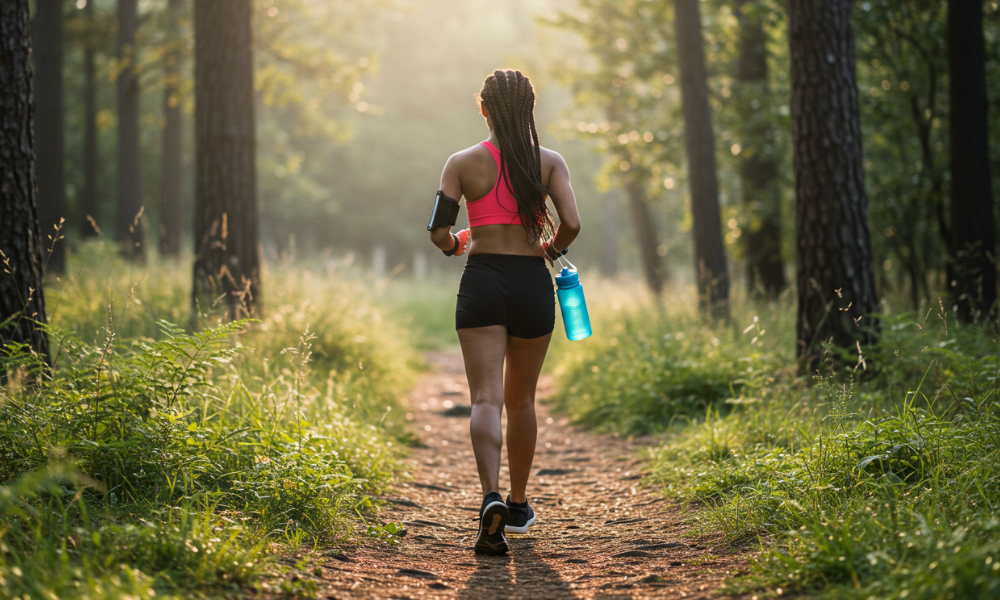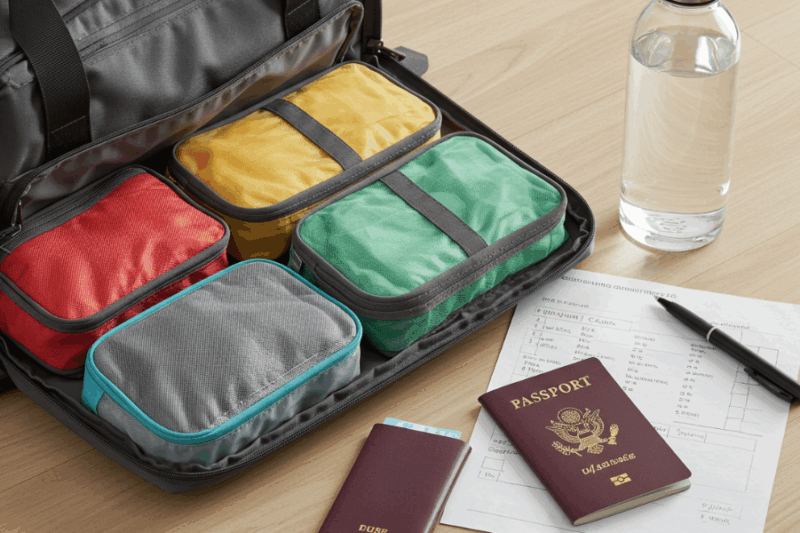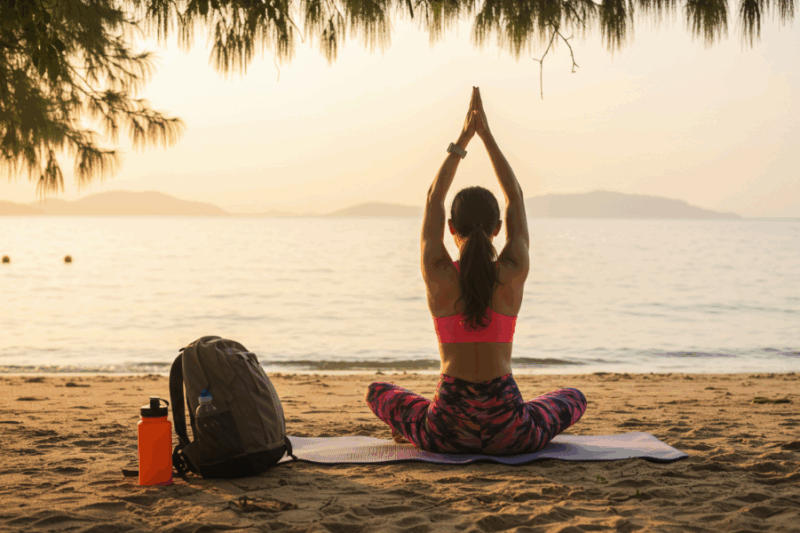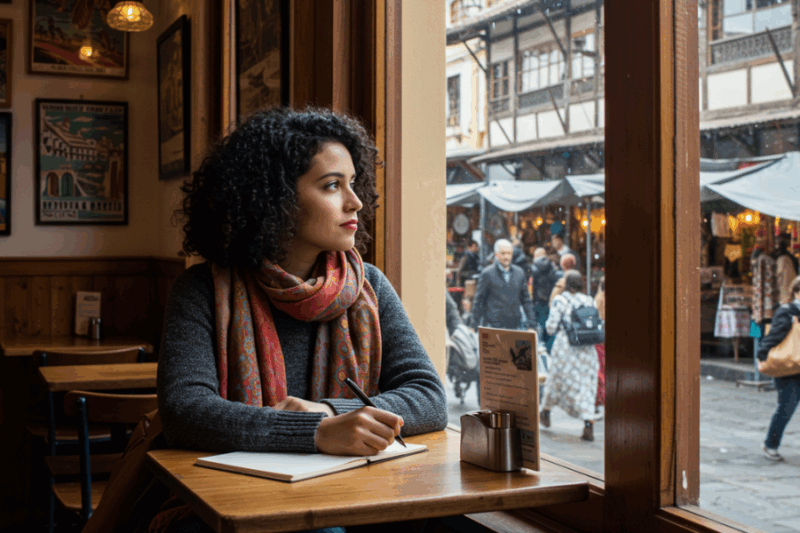Traveling can challenge your health, but adopting the habits of seasoned, healthy travelers can keep you energized, resilient, and ready for adventure. These daily practices, designed for implementation in 2025, are simple, practical, and effective whether you’re preparing for a trip or already on the road. Start incorporating them today to enhance your travel experience and overall well-being.

1. Prioritize Hydration
Habit: Drink 2-3 liters of water daily to stay hydrated, especially in new climates or during flights.
Why It Helps: Dehydration causes fatigue, headaches, and poor focus, common during travel. Flights and hot destinations increase fluid loss.
How to Start: Carry a reusable water bottle (e.g., Hydro Flask, $10-20). Sip water every hour, aiming for 8-12 ounces. In countries with unsafe tap water (e.g., Southeast Asia), use filtered stations or buy bottled water ($0.50-1). Add electrolyte packets ($1/pack) in tropical areas.
Travel Tip: Refill at airports after security to avoid overpriced bottles ($3-5).
2. Move for 20 Minutes Daily
Habit: Incorporate light exercise, like walking, stretching, or bodyweight workouts, to boost circulation and energy.
Why It Helps: Movement counters the effects of long flights, bus rides, or sedentary sightseeing. It improves mood and stamina for exploring.
How to Start: Walk 10-15 minutes morning and evening (use a tracker like Fitbit or Strava). Try a 5-minute hotel room circuit: 10 squats, 10 push-ups, 30-second plank. Follow free YouTube yoga flows (e.g., Yoga with Adriene) for flexibility.
Travel Tip: Turn city exploration into exercise—walk instead of taking taxis (saves $2-5/ride).
3. Eat Balanced, Local Meals
Habit: Choose fresh, nutrient-rich foods over processed snacks, favoring local markets or eateries.
Why It Helps: Balanced meals sustain energy and immunity, reducing travel-related digestive issues. Local food is often cheaper and fresher.
How to Start: Aim for meals with protein (e.g., eggs, fish), veggies, and carbs (e.g., rice, bread). At home, practice cooking simple dishes like stir-fries. Buy snacks like nuts or fruit ($1-2) instead of chips. In destinations like Thailand, try som tam (papaya salad, $1-2) or Greek salads in Europe ($3-5).
Travel Tip: Visit markets (e.g., Or Tor Kor in Bangkok) for affordable, healthy bites. Carry a reusable spork for picnics.
4. Practice Mindful Breathing
Habit: Do 5 minutes of deep breathing daily to manage stress and stay calm.
Why It Helps: Travel stressors like delays or language barriers can spike anxiety. Breathing regulates your nervous system, improving focus and sleep.
How to Start: Try the 4-7-8 technique: inhale for 4 seconds, hold for 7, exhale for 8. Use apps like Calm or Breathwrk for guided sessions. Practice during commutes or before bed.
Travel Tip: Use breathing exercises during turbulent flights or crowded markets to stay grounded.
5. Maintain a Sleep Routine
Habit: Aim for 7-8 hours of quality sleep, even across time zones.
Why It Helps: Sleep boosts immunity and mood, critical for enjoying travel. Jet lag or noisy hostels can disrupt rest without a routine.
How to Start: Set a consistent bedtime at home. Avoid screens 30 minutes before bed (use blue-light glasses if needed). Try a 10-minute wind-down with journaling or reading.
Travel Tip: Pack earplugs and an eye mask ($5-10) for hostels or flights. Use melatonin (1-3mg, $0.10/pill) for jet lag, adjusting sleep by 1 hour daily pre-trip.
6. Sanitize Regularly
Habit: Clean hands and surfaces frequently to prevent illness.
Why It Helps: Travel exposes you to germs in airports, public transport, or markets. Staying clean reduces the risk of colds or stomach bugs.
How to Start: Carry a small hand sanitizer (2 oz, $1) and use it before eating or after touching surfaces (e.g., subway poles). Wipe phone and tray tables with disinfectant wipes ($2/pack). Wash hands with soap for 20 seconds when possible.
Travel Tip: Choose busy food stalls for fresher meals, minimizing foodborne risks.
7. Take Micro-Breaks for Mindfulness
Habit: Pause for 1-2 minutes daily to check in with yourself and appreciate your surroundings.
Why It Helps: Travel can overwhelm with new stimuli. Mindfulness keeps you present, reducing burnout and enhancing enjoyment.
How to Start: During a commute or coffee break, notice 5 things around you (sights, sounds, smells). Write one gratitude note daily in a journal or Notes app. Try apps like Headspace for short meditations.
Travel Tip: Practice during sunset walks or cafe stops (e.g., in Lisbon’s Alfama) to savor moments.
8. Pack Light for Mobility
Habit: Build a habit of minimalism to prepare for carry-on-only travel.
Why It Helps: Lighter bags reduce physical strain and stress at airports or cobblestone streets. It saves baggage fees ($25-50/flight).
How to Start: Declutter your wardrobe to versatile pieces. Practice packing a carry-on (22x14x9 inches) for a weekend, using the 5-4-3-2-1 rule (5 tops, 4 bottoms, 3 shoes, 2 jackets, 1 accessory). Use packing cubes ($15/set).
Travel Tip: Wear bulkiest items on flights. Plan laundry ($3-5/load) to extend outfits.
9. Stay Connected Strategically
Habit: Use technology daily to stay organized and informed, but limit screen time.
Why It Helps: Connectivity aids navigation and safety, but overuse detracts from travel experiences.
How to Start: Download offline tools like Maps.me and Google Translate. Test a local SIM ($5-10 for 5GB) or eSIM (Airalo) on short trips. Set a 30-minute daily screen limit for social media.
Travel Tip: Save digital backups of passports and bookings in Google Drive. Use WhatsApp for free calls to family.
10. Build Resilience with Small Challenges
Habit: Embrace small discomforts daily to prepare for travel unpredictability.
Why It Helps: Delays, language barriers, or unfamiliar foods test patience. Resilience ensures you adapt with ease.
How to Start: Try a new food weekly, walk in the rain, or skip a coffee to practice flexibility. Journal how you handle these moments. Use affirmations like “I can handle surprises” daily.
Travel Tip: Carry a small notebook to jot down solutions during travel hiccups (e.g., finding a new cafe during a closure).
Why These Habits Work in 2025
These habits are tailored for modern travel, with global mobility rising and health awareness peaking. Digital tools (e.g., meditation apps, offline maps) and sustainable practices (e.g., reusable bottles) make them accessible. They require 10-20 minutes daily but yield lifelong benefits, ensuring you thrive on the road.
Final Thoughts
Healthy travelers stay vibrant by blending physical, mental, and practical habits into daily life. Start today—sip water, walk, breathe deeply—to build resilience for your next adventure. Whether exploring Bangkok’s markets or Paris’s streets, these practices will keep you strong, calm, and ready to embrace the journey. Begin now and travel healthier!



